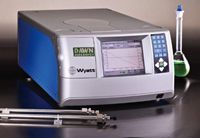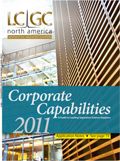Wyatt Technology Corp.
Wyatt Technology Corp. (WTC) is the world's largest company dedicated to light-scattering detectors for LC. Dr. Philip J. Wyatt, the president and founder of the company, was the developer of the first commercial multiangle light-scattering instruments more than 40 years ago.
Company Description
Wyatt Technology Corp. (WTC) is the world's largest company dedicated to light-scattering detectors for LC. Dr. Philip J. Wyatt, the president and founder of the company, was the developer of the first commercial multiangle light-scattering instruments more than 40 years ago. Dr. Wyatt is one of the world's leading authorities in the light-scattering field, holds more than 20 patents pertaining to light scattering, and is the author of four texts and over 50 publications. The company's light-scattering detectors have been sold in more than 50 countries, making them the most popular light-scattering instruments available. Wyatt Technology's extensive applications laboratory coupled with its full-time staff (including 17 Ph.D. scientists) means our customers receive deep technical expertise and support.

Chief Chromatographic Techniques Supported
- HPLC
- GPC/SEC/GFC
- RPC
- Field flow fractionation
Markets Served
Wyatt provides its products to a wide range of markets including, but not limited to, companies involved with biotechnology, pharmaceutical development, chemical, petrochemical, and academic research laboratories. In addition, WTC provides its products to the United States government and has active customers in the Food and Drug Administration, National Institutes of Health, and the U.S. Army, Navy, and Air Force. Abroad, WTC's distributor network supplies the world with products, support, and training, be it in Asia, Europe, Africa, or South America.
Major Products/Services
WTC's family of instruments includes:
- DAWN HELEOS: An 18-angle light-scattering instrument that can be used at ambient, elevated, and below ambient temperatures.
- MiniDAWN: A three-angle instrument that is ideal for proteins and peptides and molar masses below 1 million Da.
- Eclipse system: For separation of macromolecules and nano particles in solution.
- Optilab TrEX: The most advanced RI detector in the world with 256 times the detection power and 50 times the dynamic range of any other RI detector. The TrEX can be operated below or above ambient temperature and determine dn/dc at the same wavelength of light as the light-scattering instrument.
- WyattQELS: A quasi-elastic (dynamic) light-scattering instrument that can be interfaced to the DAWN or the miniDAWN Tristar in order to determine particle sizes as small as 1 nm.
- ViscoStar viscometer: A state-of-the-art intrinsic viscosity detector that can be operated above or below ambient temperature with its precise Peltier thermostatic controls. The ViscoStar also includes software for determining the Mark-Houwink coefficients for polymers and biopolymers.
- WTC Protein Columns: A family of new silica based columns specifically designed for SEC/MALS protein applications. These columns retain all the important features of a first-class SEC column for protein separations. They are made of the highest quality silica with well-controlled pore sizes and highly reproducible surface chemistry.
Facilities
WTC maintains more than 30,000 ft2 of modern electronics, optical prototype, machine shop, and laboratory facilities in Santa Barbara, California.
Wyatt Technology Corp.
6300 Hollister Ave.
Santa Barbara, CA 93117
TELEPHONE
(805) 681-9009
FAX
(805) 681-0123
WEB SITE
NUMBER OF EMPLOYEES
80
YEAR FOUNDED
1982

Determining Enhanced Sensitivity to Odors due to Anxiety-Associated Chemosignals with GC
May 8th 2025Based on their hypothesis that smelling anxiety chemosignals can, like visual anxiety induction, lead to an increase in odor sensitivity, a joint study between the University of Erlangen-Nuremberg (Erlangen, Germany) and the Fraunhofer Institute for Process Engineering and Packaging (Freising, Germany) combined behavioral experiments, odor profile analysis by a trained panel, and instrumental analysis of odorants (gas chromatography-olfactometry) and volatiles (gas chromatography-mass spectrometry).
Investigating 3D-Printable Stationary Phases in Liquid Chromatography
May 7th 20253D printing technology has potential in chromatography, but a major challenge is developing materials with both high porosity and robust mechanical properties. Recently, scientists compared the separation performances of eight different 3D printable stationary phases.
Detecting Hyper-Fast Chromatographic Peaks Using Ion Mobility Spectrometry
May 6th 2025Ion mobility spectrometers can detect trace compounds quickly, though they can face various issues with detecting certain peaks. University of Hannover scientists created a new system for resolving hyper-fast gas chromatography (GC) peaks.

.png&w=3840&q=75)

.png&w=3840&q=75)



.png&w=3840&q=75)



.png&w=3840&q=75)


















